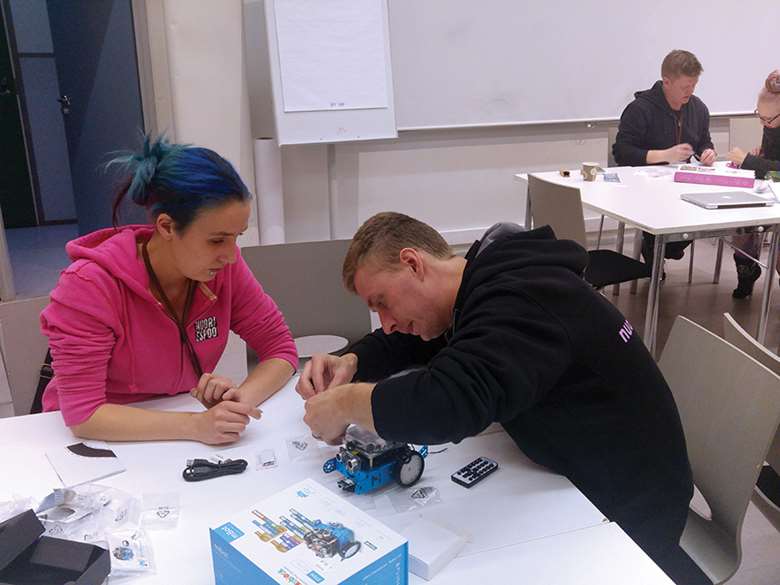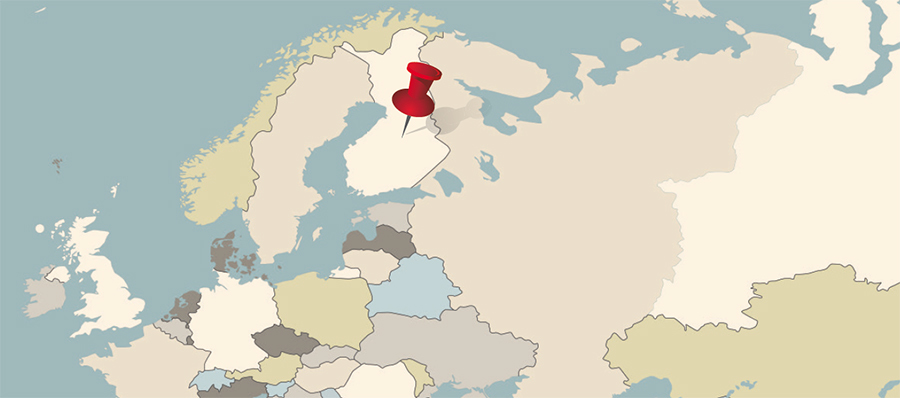Digital youth work, Finland
Sophie Eminson
Tuesday, April 24, 2018
Since the early 2000s, Finnish young people have been able to get in contact with youth workers via online communities and social media.

However, many Finnish youth workers have found it difficult to grasp what digital media might mean outside of social media, which is why there was demand for the concept of digital youth work to explain the diversity of digitalisation in youth work.
DIGITAL YOUTH WORK
The objectives of digital youth work are two-fold:
- Making youth work up-to-date and appealing to young people by utilising digital technology in youth work services
- Enhancing young people's technology-related skills
The concept of digital youth work first emerged in the Finnish youth work lexicon in the mid 2000s, when European youth work organisations met in Finland to discuss the impact of digitalisation on youth work practices.
The central idea was that the goal of digital youth work must be to strengthen the agency of young people in a digitalised world. However, the concept of digital youth work was not established until a few years later.
To ensure policymakers have the most up-to-date information and understanding of digital youth work, the Finnish Ministry of Education and Culture, which is responsible for the overall development of youth work and policy, funds Verke, the National Centre of Expertise for Digital Youth Work.
POLICY AND LEGISLATION
Under the Youth Act 2006, municipalities are responsible for youth work. Municipalities are required to create the necessary conditions for youth work and activities by providing services and premises for young people and supporting their civic engagement.
Voluntary agencies and parishes are also providers of youth work in Finland, but their work is not directly defined by the act.
Key policy documents and guidance include:
- Developing Digital Youth Work (2018). This includes policy recommendations, training advice and good practice examples for youth workers and decision makers. It was written by an expert group set up under the European Union Work Plan for Youth for 2016-2018.
- Digital Youth Work - A Finnish Perspective (2017). A publication by Verke with practical examples and theoretical backgrounds, as well as guidelines for digital youth work.
- Guidelines for Digital Youth Work. Guidance developed in response to the recommendations identified in the Screenagers International research project. By the National Youth Council of Ireland.
PRACTICE
Verke was established in 2011 and is fully funded by the Ministry of Education and Culture and managed by the City of Helsinki Youth Department. It employs six full-time staff.
Verke's duties, assigned by the ministry, include producing and compiling information on digital youth work, promoting public awareness and the quality of digital youth work by providing training and support services to youth work practitioners in Finland.
When developing digital youth work, it is important to understand the central, diverse and ubiquitous role played by digital technology in the everyday lives of young people, says Suvi Tuominen, manager of Verke.
If youth work fails to embrace the use of technology and social media, there is a risk of becoming outdated and irrelevant to young people who use youth work services, she adds.
"Youth work has the opportunity to fill the gaps which sometimes occur between home and school to support young people to understand technology," she says.
"All youth workers do not have to be technological experts, but they should have an agile mindset towards technology: willingness to try new things themselves and encourage young people to be creative with technology."
There are numerous examples of digital youth work being done in municipalities, parishes and independent organisations across Finland.
However, responses to Verke's surveys suggest that implementing digital youth work is in the hands of a few enthusiastic individuals, and the full potential of digital media and technology is still not realised widely across the sector.
Strategic development and establishing objectives in digital youth work are also relatively rare. In addition, digital craftsmanship and other methods of encouraging creative use of technology are not yet common practice in Finnish youth work.
In the near future, Tuominen hopes to see more innovative methods of digital youth work, where face-to-face work with young people is supported by online elements.
IMPACT AND PROGRESS
In 2018 and 2019, Verke is concentrating on supporting Finnish youth work organisations to undertake strategic development of digital youth work, create new innovations in the field, develop their digital youth work training and explore digital youth work in international contexts.
- More information about Verke, a podcast and a blog is available at www.verke.org

FACTFILE
- Digital literacy is recognised as a crucial skill in modern-day citizenship in Finland
- Digital youth work means proactively using or addressing digital media and technology in youth work
- Up to 30 per cent of children aged seven to eight in Finland have accessed digital media via a computer, laptop or tablet
- 100 per cent of 11- and 12-year-olds have accessed digital media in Finland via a mobile phone
- The state funds the National Centre of Expertise for Digital Youth Work, established in 2011
IMPLICATIONS FOR THE UK
By Howard Williamson, professor of European youth policy, University of South Wales
Some years ago I visited a youth work provision in Helsinki. Many of the young people there were playing computer games in solitary pursuit at their consoles. I wondered that this could be "youth work", something that I saw as quintessentially relational, collective and social. I was told that the project was partly sponsored by a gaming company, that the games were provided for free, in return for young people's evaluation of their appeal. The wider rationale or defence was that Finland was desperately searching for a new Nokia.
This was hardly youth work as I knew it and even hardly "digital youth work" as I might have envisioned it. However, there was a lot more to digital youth work than this. The Helsinki Youth Department, at the time, was also experimenting with a great deal of online engagement with young people, through the provision of information, advice, counselling and support.
For me, this is the challenge for digital youth work, just as it is for youth work in the "real world". How do we ensure an appropriate diversity of effective methodologies for reaching young people and extending suitable but attractive experiences and opportunities that will stretch their horizons and contribute to their "non-formal learning"? Rather like the pool table in the open youth club of the past, the question is not whether to have one but how it will be used.
Open youth clubs may no longer need to be just bricks and mortar. The virtual spaces of the future will need to be explored and negotiated with young people as to how they will be used, rules that are consistent with the values of youth work will need to be developed, and styles of practice formed that produce, for want of a better term, personal and social development.
A more nuanced challenge will be to distinguish between digital, social media, virtual and online. They overlap but they are different. They cover contexts of young people's lives and contexts for youth work, as well as prospective methodologies for youth work. There are passionate and polemical advocates for so-called "digital" youth work, as if it will become the only way. I am not so sure. It is early days. For sure, things are moving forward fast, but the jury is still out. Let us keep an open mind, though not an empty one.




